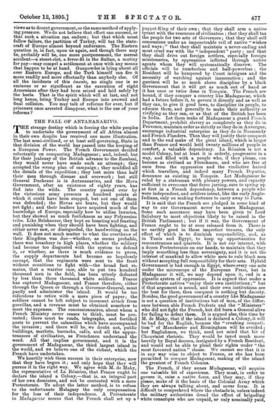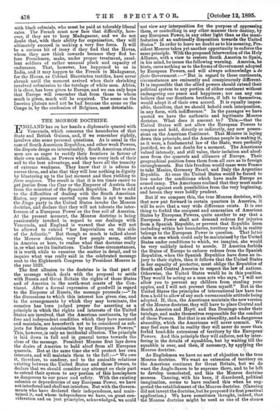THE FALL OF ANTANANARIVO. T HE strange destiny which is forcing
the white peoples to undertake the government of all Africa almost in their own despite has received one more illustration. The last semi-civilised, or at least self-governing, State in that division of the world has passed into the keeping of a European Power. The French Government decided reluctantly on conquering Madagascar ; and, indeed, but for their jealousy of the British advance to the Zambesi, they would never have made such an attempt ; they accepted the wrong plan of campaign ; they muddled all the details of the expedition ; they lost more than half their men through disease and overwork ; but still General Duchesne is in Antananarivo, and the Hova Government, after an existence of eighty years, has fled into the wilds. The country passed over by the victorious army presents a hundred points at which it could have been stopped, but not one of them was defended ; the Hovas are brave, but they would not fight ; and their leaders have acquired much of the knowledge of Europe, especially how to utilise luxuries, but they showed as much foolishness as any Polynesian tribe. Like Belshazzar, they kept on boasting and feasting and punishing when they should have been fighting, and either never saw, or disregarded, the handwriting on the wall. It does not much matter to what the overthrow of their Kingdom was due—whether, as seems probable, there was treachery in high places, whether the soldiery had become too disgusted with the system to defend it, or whether, as there is much evidence to prove, the supply departments had become so hopelessly corrupt, that the regiments were sent to the front without munitions to fight with—the broad fact re- mains, that a warrior race, able to put two hundred thousand men in the field, has been utterly defeated by less than three thousand white soldiers. France has captured Madagascar, and France therefore, either through the Queen or through a Governor-General, must pacify and administer the island. It would be too ridiculous to retire with a mere piece of paper ; the soldiers cannot be left subject to incessant attack from guerillas, and a revenue must be obtained somehow to meet the expenses. The concessionnaires, about whom a French Ministry never ceases to think, must be pro- tected ; there must be roads, telegraphs, and fortified posts to prevent the calamities which have accompanied the invasion ; and there will be, we doubt not, public buildings, markets, barracks, cafes, and all the appur- tenances of civilisation, as Frenchmen understand the word. All that implies government, and it is the government of Madagascar, the third largest island in the world, and we believe one of the richest, which the French have undertaken.
We heartily wish them success in their enterprise, now that they have begun it ; and only hope that they will pursue it in the right way. We agree with M. de Mahy, the representative of La Reunion, that France ought to declare the island a Colony,—that is, an integral part of her own dominion, and not be contented with a mere Protectorate. To adopt the latter method, is to refuse to the unfortunate Malagasy the only compensation for the loss of their independence. A Protectorate in Madagascar means that the French shall set up a puppet-King of their own ; that they shall arm a native tyrant with the resources of civilisation ; that they shall tax the people for two sets of Governors ; that they shall sell concessions under an impenetrable veil of native " wishes and ways ; " that they shall maintain a never-ending and most cruel war with the " independent" party ; and that they shall drive out foreign settlers, especially foreign missionaries, by oppressions inflicted through native agents whom they will systematically disavow. The officials will be numberless and half-powerless ; the Resident will be hampered by Court intrigues and the necessity of watching against insurrection ; and the garrison will be so much above discipline by a black Government that it will get as much out of hand as it has once or twice done in Tonquin. The French are bound, if they conquer a country like Madagascar, which had a future before it, to govern it directly and as well as they can, to give it good laws, to discipline its people, to educate them, and generally to make their authority as vivifying as they can, or as that of the British has been in India. Let them make of Madagascar a grand French Department, prohibit slavery as completely as they do in Provence, maintain order as strictly as they do in Auvergne, encourage industrial enterprise as they do in Normandy and French Flanders. Then they will justify their conquest and in the end make of the great island, which is larger than France and would bold twenty millions of people in comfort, a valuable dependency. La Reunion is not a model Colony, but at least it is orderly, progressive in a way, and filled with a people who, if they please, can become as civilised as Frenchmen, and who are free at once from the oppression and the vindictive hatred which travellers, and indeed many French Deputies, denounce as existing in Tonquin. Let Madagascar be ruled by a statesman with plenary powers, and capacity sufficient to overcome that fierce jarring, sure to spring up at first in a French dependency, between a people who were independent, and settlers intent, like the early Anglo- Indians, only on making fortunes to carry away to Paris.
It is said that the French are pledged in some kind of way to our Government never to annex Madagascar. Some such assurance may have been given to Lord Salisbury to meet objections likely to be raised in the British Parliament ; but if it was, the Government of France ought to be at once released from it. There is no earthly good in these imperfect tenures, the only effect of which is to diminish responsibility, and, as in Tunis and Egypt, to keep up opportunities for remonstrances and quarrels. It is not our interest, with a dozen Protectorates on our hands, to maintain that they imply something less than sovereignty, and it is not the interest of mankind to allow white men to rule black men without accepting full responsibility for their acts. Hybrid Government is bad enough in Egypt, where every one acts under the microscope of the European Press, but in Madagascar it will, we may depend upon it, end in a gigantic system of oppression. It is argued that under a Protectorate natives "enjoy their own institutions ; " but if that argument is sound, and their own institutions are the best for them, then conquest is nothing but dacoity. Besides, the good government of a, country like Madagascar is not a question of institutions but of men, of the differ- ence between able French Prefects and the " Ministers " who did not fight the French, but did burn a General alive for failing to defeat them. It is argued also, this time by M. de Mahy, that if the island is declared a Colony, it will be'bad for the English, because the "crushing competi- tion " of Manchester and Birmingham will be avoided ; but Englishmen, we think, need not mind that bit of Chauvinist rhetoric. They would be taxed much more heavily by Royal decrees, instigated by a French Resident, and would not be able to plead their rights under " the most favoured nation " clause. We cannot see that it is in any way wise to object to France, as she has been permitted to conquer Madagascar, making of the island the greatest of French Colonies.
The French, if they annex Madagascar, will acquire one valuable bit of experience. They must, in order to govern it, raise a native force, and they may, if they please, make of it the basis of the Colonial Army which they are always talking about, and never form. It is difficult to comprehend where the obstacle is, unless indeed the military authorities dread the effect of brigading white conscripts who are unpaid, or only nominally paid, with black colonials, who must be paid at tolerably liberal rates. The French must now face that difficulty, how- ever, if they are to keep Madagascar, and we do not doubt that, with their ability for organisation, they will ultimately succeed in making a very fine force. It will be a curious bit of irony if they find that the Hovas, whom they now think cowards because they fled be- fore Frenchmen, make, under proper treatment, excel- lent soldiers of rather unusual pluck and capacity of endurance. That, however, has happened to us in India, and it may happen to the French in Madagascar, for the Hovas, as Colonel Shervinton testifies, have never shrunk until the moment arrived when their shrinking involved submission to the tutelage of white men. Africa, it is clear, has been given to Europe, and we can only hope that Europe will remember that from those to whom much is given, much will be required. The scene on the Imerina plateau need not be bad because the scene on the Congo is, by the confession of Belgians, most detestable.



















































 Previous page
Previous page